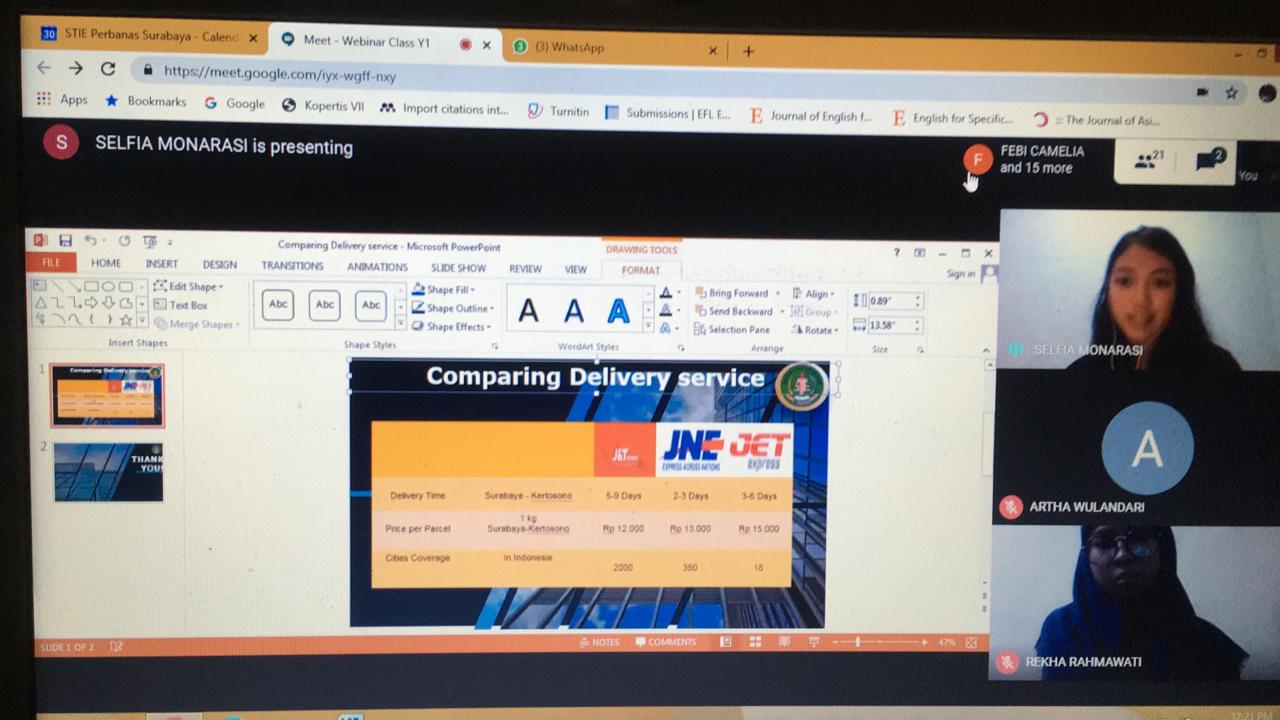Webinar: A Strategy to Enhance Speaking Skill of Non-native English Speakers
DOI:
https://doi.org/10.21070/jees.v5i1.354Keywords:
webinar, teaching, speaking, ESPAbstract
Low competence in speaking for the students of Non-native English speakers has been crucial challenge so far for the teachers in language teaching in Indonesia. This study attempts to explore the effect of webinar applied in teaching speaking on Students of Non-native English Speakers at one of Business schools in Surabaya. There are three classes observed in this study. Before the webinar was applied, the groups were given test to check their proficiency. After conducting the webinar class, the post-test was given to the groups. The instruments to get the data was the oral test. The results reveal that there is an improvement on post test score in the two out of three classes observed. In contrary, the last class has no improvement on their post test score. Moreover, barriers found during the implementation of webinar in speaking class will be explored.
HIGHLIGHTS:
- There is an improvement on the speaking score with webinar using on the two from three classes observed.
- Practically, the findings of this study are likely able to give positive contribution and technology using experience to all English teachers as well as the students.
Downloads
References
Agnes, W. S. K. (2012). Relationship between participation in the webinar and students’ behaviours and engagement in online learning.
Ahrens, A., Zascerinska, J., Ramar, H., and Andreeva, N. (2016). Educators’ opinion on webinars in higher education. SOCIETY. INTEGRATION. EDUCATION. Proceedings of the International Scientific Conference, 1:15–15.
Budiana, K. M. (2015). The Learners Attitude toward Video on Studentsof Non Native English Speakers at STIE Perbanas Surabaya. In 63rd TEFLIN International Conference, page 515.
Cakir, I. (2006). The use of video as an audio-visual material in foreign language teaching classroom. TOJET, 5:4–9.
Chuanchaisit, S. and Prapphal, K. (2009). A Study of English Communication Strategies of Thai University Students. MANUSYA, 12(3):100–126.
Cigognini, M. E., Indire, G. P., Fattorini, R., and Boscarol, M. (2015). Lecture vs Webinar: Engagement and distraction in distance learning adult teachers. In and others, editor, Proceeding from “EDEN Annual Conference-Expanded Learning Scenarios, pages 9–12. Expanding Learning Scenarios.
Gegenfurtner, A., Zitt, A., and Ebner, C. (2020). Evaluating webinar-based training: a mixed methods study of trainee reactions toward digital web conferencing. International Journal of Training and Development, 24(1):5–21.
Kohorst, K. and Cox, J. R. (2007). Virtual office hours using a tablet PC: Elluminating biochemistry in an online environment. Biochemistry and Molecular Biology Education, 35(3):193–197.
Marx, R. (2015). Investigating the effectiveness of using MOOCs and webinars in enhancing teaching and learning in a Teaching English as a Foreign Language (TEFLA) course in a distance education environment : a case study of a Short Learning Programme.
Piyarat, P., , and Wareesiri, S. (2018). Metastrategies Employed by Science and Engineering EFL Learners in a Speaking Task. The Journal of AsiaTEFL, 15(1):66–81.
Rao, P. (2019). Webinars and their Effective use in English Language Teaching and Learning. ELT Vibes: International E-Journal For Research in ELT, 5(1):73–97.
Robinson, C. S. (2015). The effects of composition and literature webinars on students’ performance.
Sweeney, S. (2009). Internationalisation and the use of electronic media in teaching and assessment. Live webinars and audio feedback: apparent benefits and drawbacks. Enhancing Learning in the Social Sciences, 2(1):1–21.
Wang, S.-K., Hsu, and Hui-Yin (2008). Use of the Webinar Tool (Elluminate) to Support Training: The Effects of Webinar-Learning Implementation from StudentTrainers’ Perspective. Journal of Interactive Online Learning, 7(3):1541–4914.

Published
How to Cite
Issue
Section
License
Copyright (c) 2020 Kartika Marta Budiana, Hariadi Yutanto

This work is licensed under a Creative Commons Attribution 4.0 International License.







